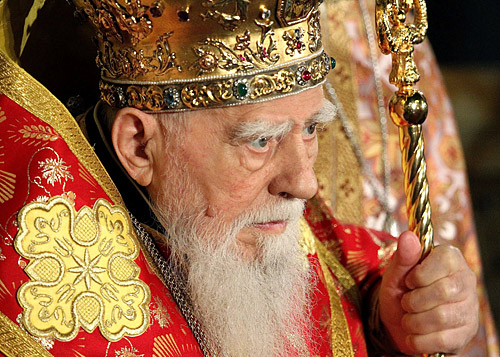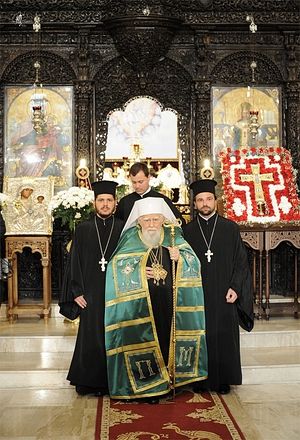This article was written for the 98th birthday of His Holiness Patriarch Maxim, which all of Bulgaria celebrated on October 29, 2012. On the night of November 6, His Holiness was no more.
Very few people understand that this man is the most precious among us all. Statesmen work until the end of their terms, but he will serve his people until the end of his life.
His quiet, yet steadfast labor for the sake of his fatherland could never be replaced by Comecon, by the Warsaw Pact, NATO, or the European Union taken all together. Eighty-five years of his life were spent under the church domes, and the altar is his true home. There, His Holiness prays no less than three times a day for the well-being of his people, and none of the petty fights or scandals in the Church or the government can prevent him. Patriarch Maxim has been inseparably at his post for decades, and cares for all the Orthodox Bulgarians. Some think he has grown weak and decrepit. It is your heads that are weak, my friends!
Who would think that a man who has broken both legs and a hip at age ninety-three could then get up, throw off his crutches, and walk again? That at age ninety-eight he could work fifteen hours a day, read without glasses, and write his own reports on a typewriter? His Holiness does this. He literally receives help from those who are beyond time and space. He is our direct connection with God.
He lives in very modest conditions. Modest and wise is the inhabitant of the second floor of the Sofia Metropolia building on Kaloyana Street 7.
How does His Holiness’s day begin? He rises at around 6:00 a.m., makes his bed, performs light physical exercises, and goes to pray at the altar that is in his sleeping quarters. After prayers, at about 8:00, His Holiness emerges from his room.
There, breakfast is waiting for him. His favorite fare is strong Ceylon tea with rye toast and a piece of feta cheese. There are also usually lemons and olives on his table.
After breakfast he looks over his to-do list for the day. Before beginning to tackle it, he goes into the yard to admire and breathe the aromas of the many different kinds of geraniums and basil plants that grow abundantly in the Metropolia garden and on his terrace.
The Patriarch is not fussy about his food. He usually takes lunch at 1:00, and when there is a Synodal session, at 3:00. He likes vegetable soup, Bulgarian peppers, tomatoes, carrots, onions, cucumbers, and boiled potatoes.
It is amazing how a man with serious diabetes and at such an age not only works so many hours, but also keeps the Church fasts strictly. He does not drink cold water, he mixes his wine with water, taking very little.
The ninety-eight-year-old Patriarch almost never naps after lunch. Instead, he checks his mail and answers letters.
The writing desk in his office is piled with books. At 98, Patriarch Maxim can read even small print. He reads copiously. The lamp in his sleeping room burns until two or three in the morning. On his desk are many books on history, herbal medicine, and other kinds of medicine. He prepares his own reports for the Synodal sessions and types them on a typewriter. Then he takes the reports to the chancery, where they enter them into a computer. The Patriarch does not use a computer or a mobile phone.
His has a team of three
His modest entourage is an example to statesmen. There are two women who take care of his household—Nadka from Pleven and Svetla from Lakatnika. They and his driver Stoyan Krushkin make up the Patriarch’s retinue. He uses two old limousines, a Mercedes and and BMW, both of which are eight to ten years old. His favorite place is the Troyan Monastery, near his native village of Oreshak.
He talks on the phone everyday to his niece, who was named after him—Maximka. Maximka Konstantinova is the daughter of his deceased brother, Kosta. She is a doctor who works at the First city hospital in Sofia, and is essentially His Holiness’s house doctor. Whenever he is sick, he is taken to the government hospital.
Of all the Church services he most loves the Divine Liturgy. It is served daily in the Metropolitan Cathedral church of St. Nedeli.
The Patriarch is humble and biblically wise. How otherwise could he have overcome the schism, out of which our Orthodox Church emerged stronger and more united?
The attributes of his authority are a sign of this. The Patriarchal staff is crowned with two arching serpents with tongues extended, between which is a cross encrusted with precious stones. The serpents symbolize the wisdom of a spiritual pastor. Be ye wise as serpents and harmless as doves, as it is written in the Gospels.
On the Patriarchal seal is a crown, and under it are intertwined dikeria and trikeria (a hand-held candle holder with two candles, and a second with three), symbols of Patriarchal authority.
The village of Oreshak receives no special benefits from its famous native son. His Holiness does not make special requests on its behalf, so that he would not be accused of favoritism. The Church is the same for all, he says, and he provides a personal example of this. Banks and other companies have offered him expensive limousines and much else, but His Holiness always refuses gifts. The previous regime also wanted to “buy” him and started building him a villa. His Holiness sent the builders packing along with their building materials and equipment. Naïve people! They do not know that his home is the Church, and nowhere else.
His Holiness and the Politburo
Was he chosen according to the canons for the Patriarchy during Communism? At the inauguration of democracy, this seemed to be a relevant question, but now it sounds silly. Here is how the events unfolded.
July 4, 1971 was a big day for Bishop Maxim. The then Metropolitan of Lovich was chosen by a Church and Laypersons’ council as the Bulgarian Patriarch and Metropolitan of Sofia, at the approving proclamations of “Axios”, or “He is worthy”. He received 98 votes out of 101.
Preparations for the election began after the repose of Patriarch Kirill on March 7, 1971. On March 13, Metropolitan Maxim was chosen as the Locum Tenens of the Patriarchal Throne. On May 19 the bishops set the election day to be July 4.
All canonical procedures for the call, organization, and conduct of the council were observed. The Council began in the Synodal chapel of the Holy Tsar Boris, and the elections took place in the Synodal chambers.
Participating in the council were all the bishops, seven representatives of each diocese (three clergy and four laypeople, with twice that number from the diocese of Sofia), one representative from each of the stravropegial (governed by the Patriarch) monasteries and theological schools. Also present were representatives from the Fatherland Front, the chairman of the Bulgarian Orthodox Church Affairs Committee, and members of the Bulgarian Academy of Sciences and of the Supreme Court.
The Politburo of the Central Committee of the Bulgarian Communist Party decided to support (not push forward and choose!) the candidate, Metropolitan Maxim. This matter was dealt with by the Chief of the Commission for Church Affairs Mikhail Kliuchukov. He was also supported by the young Defense Minister Dobri Dzhurov, Met. Maxim’s countryman and seminary graduate. Todor Zhivkov also had a good relationship with the new Patriarch and fulfilled his request to restore the Theological Seminary in the Cherepish Monastery, and to preserve the Church of the Holy Savior in Sofia, which the Council of Ministers had resolved to destroy.
After advent of democracy, His Holiness bore with stoic fortitude attacks from schismatics and from a faction of political elite, and meekly brought them to reason. The Patriarch was always against using the Church for political purposes. He follows the words of Patriarch Kirill said to him fifty-four years ago: “There is no place for rest on this path. No one can say to himself, “Here I will rest a bit, or there I will stop at dusk and then set off on the road again at sunrise. You must walk the whole time—day and night, winter and summer, healthy or sick…” The Patriarch has been walking that path for eighty-five years—from the moment he put on his monastic garments.
He admits: “Perhaps I have made mistakes, but I have never made compromises to the detriment of the Church. I have chosen what is beneficial to the Church, and not my own benefit.”
A monk at age twelve
Marin Naidenov was born on October 29, 1914 in the village of Oreshak, Troyan district, on the repose day of the great Bulgarian poet, Peyo Yavorov. Five bishops came from his native village before him, and this foreshadowed his own future. After finishing grade school, his father, Naiden Minkov and mother, Pena Bordzhukova gave their twelve-year-old son to the monastery, where he became a novice. After three years he entered the Sofia Theological seminary and graduated with honors in 1935, then became the office secretary of the Church of the Dormition of the Most Holy Theotokos in Ruse. In 1942 he graduated from the Sofia University department of theology.
On December 13, 1941, he became a monk and took the name Maxim. A week later he was ordained a hierodeacon, and on May14, 1944 he became a hieromonk. From 1942 to 1947, he worked as a teacher in the Sofia Theological Seminary. Then he became an archimandrite, and served three years as the protosingel of the Dorostol-Cherven metropolia.
Until 1955 he was the head of the Bulgarian Church representation in the Moscow Patriarchate, Moscow. After returning to Bulgaria he served until 1960 as the chief secretary of the Holy Synod. On December 30, 1956 he was consecrated a bishop with the title Bishop of Branitsa. On October 30, 1960 he was chosen to be the Metropolitan of Lovich, and on November 29 of the same year he was canonically confirmed in that position.
After the death of Patriarch Kirill, from March 13 to July 4, 1971, he was the Patriarchal Locum Tenens. On July 4, 1971, Metropolitan Maxim was elevated by the Patriarchal Church and Laypersons’ Council to the throne of the Sofia Metropolia and Patriarchy of Bulgaria.
From: Pravoslavie.bg


